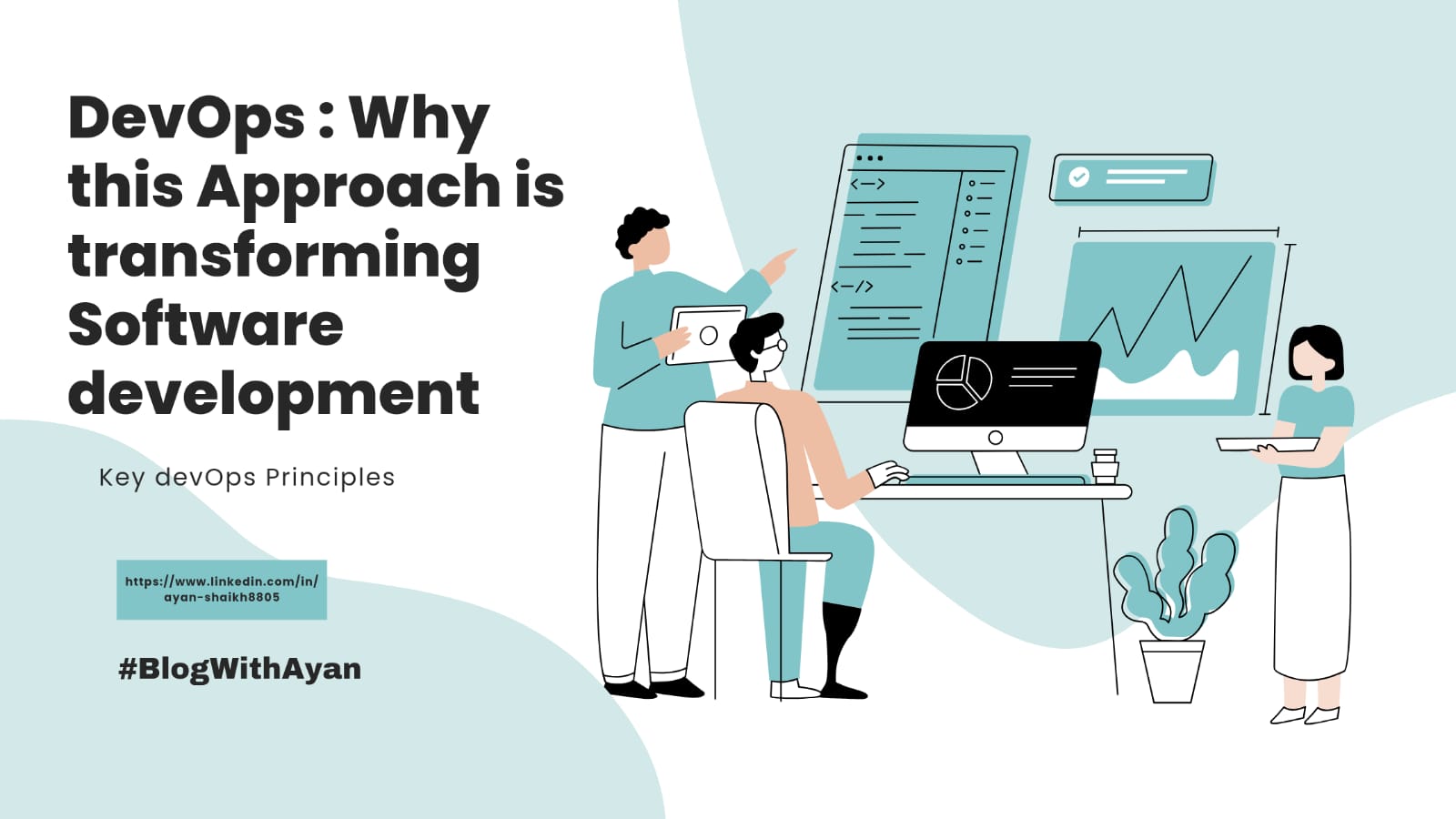"DevOps : Why This Approach is Transforming Software Development"
 Ayan
Ayan 
In today’s fast-paced tech world, delivering high-quality software quickly and efficiently is more important than ever. This is where DevOps comes into play. But what exactly is DevOps, and why has it become a cornerstone of modern software development? In this post, we’ll explore the fundamentals of DevOps, its core principles, and why it’s essential for today’s software teams.
What Exactly is DevOps?
Imagine if development and operations teams worked seamlessly together, breaking down barriers and streamlining workflows. That’s the essence of DevOps. It’s a cultural and technical movement that’s all about uniting these traditionally siloed teams to deliver high-quality software faster and more efficiently.
In a nutshell, DevOps is about creating harmony between development and operations, promoting collaboration, and using automation to turbocharge productivity.
The Secret Sauce: Key DevOps Principles
So, what makes DevOps tick? Here are the core principles that fuel its success:
Collaboration and Communication:
- DevOps thrives on enhanced collaboration and open communication, ensuring everyone is on the same page and working towards common goals.
Automation Magic:
- Automation is the heartbeat of DevOps. By automating repetitive tasks—like code integration and deployment—you reduce errors, speed up processes, and free up time for more creative and strategic work.
CI/CD: The Dynamic Duo:
- Continuous Integration (CI) and Continuous Deployment (CD) are game changers. CI means integrating code changes frequently, while CD automates the deployment process. Together, they keep your software fresh and up-to-date with minimal fuss.
Real-Time Monitoring and Feedback:
- DevOps isn’t just about setting it and forgetting it. Continuous monitoring and real-time feedback are crucial for spotting issues before they become problems. This proactive approach ensures smooth operations and enhances performance.
Infrastructure as Code (IaC):
- Imagine managing your infrastructure with the same ease as coding. IaC lets you define and manage your infrastructure through code, ensuring consistency and making infrastructure management a breeze.
Why DevOps is a Game Changer
So, why should you jump on the DevOps ? Here’s why it’s a game changer:
Speed to Market:
- DevOps accelerates software development and deployment, helping you get to market faster and respond quickly to changes. Speed matters, and DevOps delivers.
Quality at Its Best:
- With continuous integration, automated testing, and ongoing monitoring, DevOps helps you deliver high-quality software. Early detection of issues means fewer bugs and a better end product.
Efficiency Boost:
- Automating repetitive tasks and optimizing workflows means your team can focus on innovation rather than mundane tasks. Efficiency skyrockets, and so does your productivity.
Stronger Team Collaboration:
- DevOps fosters a culture of collaboration and shared responsibility. Development and operations teams work hand-in-hand, leading to smoother processes and better outcomes.
Reliability and Performance:
- Continuous monitoring and real-time feedback ensure that your applications run reliably. With DevOps, you can address performance issues proactively, keeping users happy and engaged.
Ready to Get Started with DevOps?
If you are thinking of diving into DevOps? Here’s how you can start:
Build a DevOps Culture:
- Foster open communication and collaboration between teams. Create an environment where everyone works together towards shared goals.
Automate Wisely:
- Start by automating key tasks like code integration and deployment. Expand automation as you get more comfortable and see the benefits.
Understand CI/CD:
- Set up CI/CD pipelines to streamline your code integration and deployment processes. This will keep your software up-to-date and reduce manual intervention.
Monitor and Improve:
- Implement monitoring tools to keep an eye on system performance. Use the insights you gather to make continuous improvements.
Invest in Learning:
- Equip your team with the knowledge and skills they need for DevOps. Training and resources are crucial for a successful transition.
In Summary
DevOps is more than a buzzword—it’s a transformative approach to software development and operations. By breaking down silos, leading automation, and focusing on continuous improvement, DevOps helps organizations deliver high-quality software more efficiently. As technology evolves, DevOps practices will be essential for staying ahead in the competitive software landscape.
Ready to take the plunge into DevOps? Start by exploring its core principles, embracing automation, and fostering a collaborative team culture. The journey to DevOps can significantly enhance your development practices and set you up for greater success.
Thank you for joining me on this journey. I look forward to engaging with you and exploring more topics regarding technology.
Feel free to join the conversation! If you have any thoughts or experiences related to DevOps, I’d love to hear from you !!
#DevOpsAutomation #DevOps #DevOpsEngineer #CI_CD (Continuous Integration / Continuous Deployment) #ContinuousDelivery #TechCommunity #DevOpsTalk #Technology #LearnDevOps #DevOpsJourney
Subscribe to my newsletter
Read articles from Ayan directly inside your inbox. Subscribe to the newsletter, and don't miss out.
Written by

Ayan
Ayan
Hello! I'm Ayan Shaikh a passionate technologist with a diverse skill set in web applications, data science, machine learning, and cloud computing. I specialize in data science and Cloud computing. I also enjoy sharing my knowledge through technical writing, code reviews, and mentorship, helping developers improve their skills and practices. As an active member of Toastmasters International, I hone my public speaking skills and participate in tech conferences and webinars. Beyond tech, I'm a mental health advocate and peer counselor, supporting individuals with empathy and understanding. In my free time, I explore advancements in data science, machine learning, and cloud computing. Feel free to connect if you'd like to collaborate or chat about tech, mental health, or anything in between!